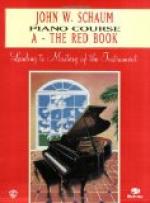The question is often put to artists: “Do you deem it necessary to work for velocity, or do you practise the composition much at the required speed?” Many pianists practise very slowly. This was William H. Sherwood’s custom. Harold Bauer believes velocity to be inherent in the individual, so that when the passage is thoroughly comprehended it can be played at the necessary rate of speed. Bachaus testifies he seldom works for velocity, saying that if he masters the passage he can play it at any required tempo. “I never work for velocity as some do,” he remarks. “I seldom practise fast, for it interferes with clearness. I prefer to play more slowly, giving the greatest attention to clearness and good tone. By pursuing this course I find that when I need velocity I have it.”
Clarence Adler counsels pupils always to begin by practising slowly—faster tempo will develop later, subconsciously. Velocity is only to be employed after the piece has been thoroughly learned, every mark of expression observed, all fingering, accents and dynamic marks mastered. “You would scarcely believe,” he adds, “how slowly I practise myself.”
A FEW EXCEPTIONS
There are very few exceptions to the general verdict in favor of technic practise apart from pieces. Godowsky asserts he never practises scales. Bauer cares little for pure technic practise, believing the composition itself contains sufficient material of a technical nature.
Whether or not these brilliant exceptions merely prove the rule, the thoughtful student of the piano must decide for himself. He has already discovered that modern piano playing requires a perfect technic, together with the personal equation of vigorous health, serious purpose and many-sided mentality. Mme. Rider-Possart says: “Technic is something an artist has to put in the background as something of secondary importance, yet if he does not possess it he is nowhere.” The student will not overlook the fact that to acquire the necessary technical control he must devote time and thought to it outside of piece playing. He must understand the principles and follow out a certain routine in order to secure the best results in the quickest and surest way. While each one must work out his own salvation, it is an encouragement to know that even the greatest artists must toil over their technic, must keep eternally at it, must play slowly, must memorize bit by bit. The difference between the artist and the talented amateur often lies in the former’s absolute concentration, perseverance and devotion to the highest ideals.
SECTION IV
How to Memorize




